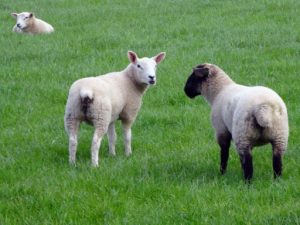“A solid economic case for sheep farmers to instead grow forests and become carbon offsetters.”
“Our sheep farmers are managing one of our most precious resources – grassland.”
.
It’s clear that trees are a good thing for many reasons:
Plant lots of trees to tackle climate change – Vision Group for Sidmouth
 But are they compatible with sheep – whether on hills and moors:
But are they compatible with sheep – whether on hills and moors:
Sheep farming in Cumbria – Vision Group for Sidmouth
Or in narrow coombes?
Sheep farming in the Sid Valley – Vision Group for Sidmouth
Clearly, sheep have been part of the landscape for centuries:
Futures Forum: Devon County Show Lamb Shearing and Dog Trials at Home Farm in Sidbury
However, there is growing thinking that they are more destructive than we thought:
George Monbiot on ‘rewilding’ the countryside and the end of sheep | inews.co.uk
Especially in the context of the debate around ‘rewilding’:
There is alternative thinking – that sheep and trees can not only co-inhabit the landscape – but in positive ways – and that includes local nature reserves:
Futures Forum: Peaslands Knapp… meadows and sheep
As well as very ambitious projects:
Futures Forum: Wild Farming in South Devon @ BBC Radio 4
Futures Forum: The role of trees and sheep in managing flood risk
This is from a piece from this week’s Conversation which looks at the latest thinking:
Britain needs to grow more trees – are sheep farms the answer?
Britain’s green fields and “wild” uplands may have become important parts of the national heritage, but they are landscapes wholly created by people. There’s no reason to think of these areas as precious natural resources to be preserved at all costs. If humans hadn’t chopped down the trees, most of what are now Britain’s sheep farms would still be part of the large forests that once covered the islands. So why can’t some of these areas be turned back into woodland?
Doing so would help fight climate change, as trees absorb carbon from the air and keep it out of the atmosphere. As we found in our new research, there’s even a solid economic case for sheep farmers to instead grow forests and become carbon offsetters…
Britain needs to grow more trees – are sheep farms the answer?
F&FF – Technical and Business Information
Some in the farming community think it’s a good idea – but most don’t:
NSA dismisses academics’ ‘trees better than sheep’ claims
… NSA chief executive Phil Stocker believes these arguments are too simplistic and overlook the multiple benefits of rearing sheep. “What these scientists ignore is that we have to look at land management on a multi-functional basis, not just one metric of carbon,” he said. “Our sheep farmers are managing one of our most precious resources – grassland – while also producing fantastic and nutritious food from it.”
Grassland also builds and stores soil carbon, he added, and creates wildlife habitats which specifically benefit curlews, lapwing, skylarks and barn owls. “It also enables people to improve their mental and physical wellbeing, and it avoids wildfires with their huge environmental consequences.”…
NSA dismisses academics’ ‘trees better than sheep’ claims – Farmers Weekly
Farmers must weigh up rewilding risk and reward – Farmers Weekly
To finish, the most eloquent voice in English sheep farming is also passionate about wildlife: he has a huge Twitter following:
(16) James Rebanks (@herdyshepherd1) / Twitter
And he has a new book out:
English Pastoral by James Rebanks review: a heartfelt polemic on the state of British agriculture (paywall)